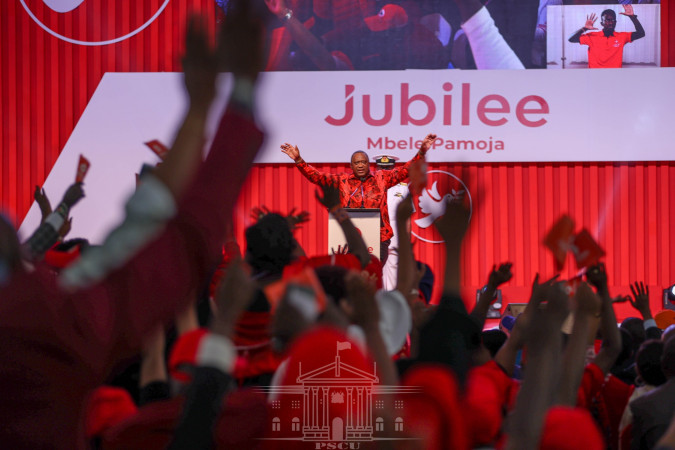Once so jubilant, Uhuru party now folds into a shell
By Eric.Wainaina, August 30, 2022The fate of the Jubilee Party seems to have been sealed long before the August 9 polls, following the fallout of President Uhuru Kenyatta and his deputy, William Ruto.
It shrunk from a massive machine to a rudderless raft, and then to a dispirited struggler seeking a lost identity.
Currently, it is grappling with numerous problems. It suffers disfavour in its strongholds and is besieged by greedy individuals who, eyeing quick money from its campaign kitty, fielded weak candidates birthed by skewed nominations.
Low voter turn-out in its perceived Mt Kenya catchment was yet another setback, setting a date with its Waterloo in the just-concluded polls. Touted as the party for Mt Kenya, Jubilee suffered major defeats at the hands of United Democratic Alliance (UDA), which eventually swept all governor, Senate and Woman Reps positions.
What Jubilee took comfort in are constituency seats, save for four, and over 90 per cent of Ward Rep positions. A post-election audit blames officials at its Pangani headquarters who allegedly influenced the nomination of unpopular aspirants, raising the tide against Uhuru.
But it bagged Laikipia North, Ol-Kalou, Kinangop and Nakuru West seats through Sarah Korere, David Kiaraho, Kwenya Thuku and Samuel Arama, respectively.
Not even its officials were spared, led by secretary-general Jeremiah Kioni of Ndaragwa, outgoing Kieni MP Kanini Kega (who doubled as director of elections) and National Assembly Leader of Majority Amos Kimunya of Kipipiri (who sits in the party’s management committee).
Analyst Macharia Munene says candidates in Mt Kenya region who vied on Jubilee tickets paid a huge prize for its shortcomings. The history professor adds that local voters were keen to punish the party’s leadership and its arrogant officials.
He also cites structural disorganisation such as lack of campaign strategies and facilitation, adding: “The party needs a rethink. People are unhappy with Jubilee. There’s something wrong within it”.
Uhuru, keen to retain his hold on the party, which was formed after a merger of his defunct The National Alliance (TNA) and Ruto’s United Republican Party (URP), launched an aggressive campaign, hoping Mt Kenya region could use Jubilee for negotiations inside Azimio coalition.
This followed a mass walk-out to UDA by Ruto-aligned leaders, as well as several embarrassing defeats in four local by-elections. To start with, the party mounted a charm offensive on Mt Kenya region through grassroots campaigns and defections of popular candidates from alternative, fringe parties.
They included Laikipia Governor Ndiritu Muriithi, who initially was to defend his seat on PNU, and his Nakuru counterpart Lee Kinyanjui, who had even launched Ubuntu Party but returned to Jubilee. Others are former Kigumo MP Jamleck Kamau, who had branded his campaign vehicles with Chama Cha Kazi colours.
All were defeated at the polls. Munene says the electorate did not have issues with individual candidates, hence why Jubilee bagged seats in other parts of the country, notably Nairobi, Lamu, and parts of north-eastern.
Angered Mt Kenya
He explains that candidates who lost should blame it on a party whose leadership had angered the region. “Their campaigns suffered high levels of disorganisation and inadequate resources to mobilise voters and hire agents,” Munene adds.
After the debacle in Juja and Kiambaa by-elections, some Jubilee MPs and Ward Reps mooted plans for party rejuvenation, including recruitment of new officials at all levels. Vice-chairman David Murathe and former secretary general Raphael Tuju were some casualties of the revamp, amid claims that their continued stay in office was bleeding the party. New faces included Kega, Nyeri Town’s Ngunjiri Wambugu, Jude Njomo (Kiambu Town) and Sabina Chege (Murang’a Woman Rep).
Many unsuccessful candidates now accuse the party and its officials of abandoning them, without the promised funds for campaigns. The party had promised them sufficient money for materials such as billboards, posters, banners, logistics, publicity and civic education. But whenever money was released, it was allegedly pocketed by a few individuals, they claim.
In Kiambu, for instance, Jubilee candidates like George Maara (Senate), Gladys Chania (Woman Rep), Wanjiku Kibe (Gatundu North) and Njenga Mwethi (Kabete) accused Governor Njoro of antagonising their bids by backing their rivals.
They said he was giving their rivals platforms to advance their campaigns, claims that Nyoro dismissed. “This was a political season where you should expect all forms of accusations. How can I support a candidate in an opposing camp?” he quipped.
Backing rivals
Maara was unhappy that Nyoro was seemingly backing his (Nyoro’s) former head of delivery in the county, John Mugwe, while Chania said the governor was inviting gospel musician Loise Kim, a rival, to his campaigns. Several candidates for MCA position also accused MP candidates in Mt Kenya region, especially incumbents, of short-changing them.
At the party headquarters, the offices remained unmanned. Party officials spent most of the time in their respective constituencies, trying to calm the hostile ground. Meanwhile, candidates had no officials there to hear their grievances.
Kioni, who is the SG, was seeking re-election. Deputy Joshua Kutuny of Cherang’any was preoccupied with his campaigns. Kega was cooling fires in Kieni, while his deputy, Kitui South’s Rachael Nyamai, was busy on her re-election campaign. She succeeded.
Meanwhile, some Jubilee bigwigs have already cried foul play, claiming they lost the August polls due to lack of a collective strategy. They are threatening to file court petitions challenging the polls outcome.
